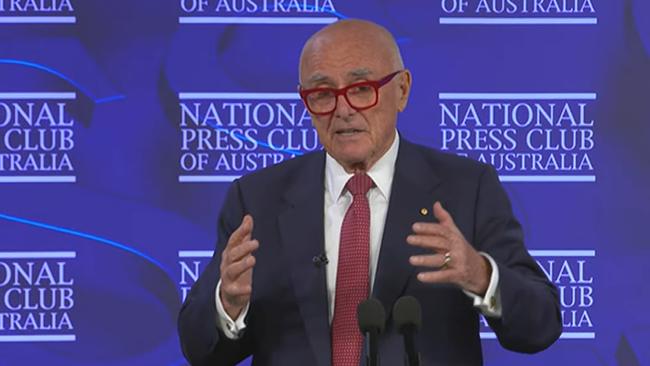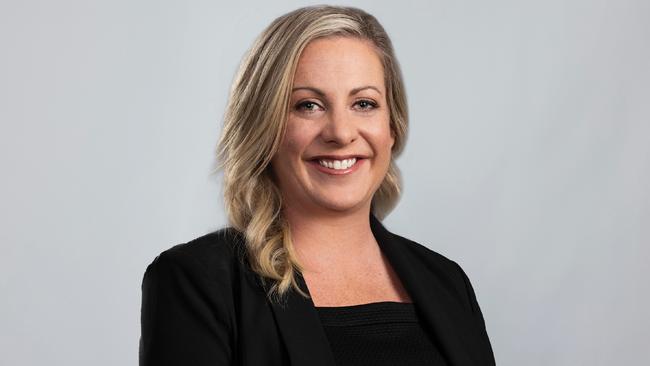WiseTech turmoil exposes corporate governance gaps
Richard White’s boardroom manoeuvring has raised red flags over governance at WiseTech, drawn scrutiny from ASIC and wiped more than $10bn from the tech giant’s value.

The board charter of logistics software company WiseTech is full of high-sounding statements including the need for an independent chair, with the company having a majority of independent directors who must “uphold ethical standards and corporate behaviour”.
But it does point out that its definition of “independent” when it comes to directors might be different to the ASX Corporate Governance Council’s corporate governance principles.
The charter and the events of recent weeks at the company highlight two factors: many ASX companies are publicly committed to high-sounding governance standards but, in practice, the application of what may be called “corporate governance” can vary.
The clash between WiseTech founder and major shareholder Richard White with other board directors, his stepping in as executive chair, WiseTech’s tumbling share price and a review by ASIC is the latest example of what happens when corporate governance standards are breached.
While White is not accused of any criminal behaviour, and the accusations against him appear to be largely confined to his personal life, he will need to tread carefully if perceived breaches of corporate governance standards are not to become a drag on the stock.
“If a business is going to incorporate publicly, those businesses should comply with good corporate governance standards,” said Allan Fels, former chair of the Australian Competition & Consumer Commission.
Fels points out that corporate governance standards are particularly there to protect small shareholders: “I don’t approve of riding roughshod over corporate governance requirements. Longer term, shareholders will pay the price.”

One of the problems here with WiseTech, Fels points out, is that it is dominated by a founder and major shareholder.
“This illustrates that the corporation law applies much less than fully to the businesses led by founders with significant shareholdings,” he says. “This outcome would not happen in a conventional public company.”
In White’s case, many of the smaller shareholders, who include many of his staff, are loyal to him personally, admire him for his entrepreneurial success and see him as a key driver of the company’s success.
Some analysts have pointed out that White stepping back from the company in recent months has been reflected in the latest results released this week. While the results were good, they argue they would have been better had White been more engaged.
As Fels says, the definition of corporate governance standards differs from country to country, with the US much more comfortable with executive chairs, and founder shareholders having more power over listed companies.
This was evident in this week’s report on WiseTech by US-owned investment research house Morningstar, which enthusiastically welcomed White’s return to active management of the company.
Morningstar raised its fair value estimate of WiseTech’s share price to $115 on the back of the first-half results – well above the $91 range they are trading at.
“Our upgrade comes from the appointment of Richard White to the board as executive chairman, which reduces lingering uncertainty around chain of command, compared with the previously discussed consultant role,” it said.
“We believe White has been instrumental in many of the company’s key innovations and strategic decisions critical to the company’s success. As executive chairman, White will continue driving the company’s product and growth strategies.

“WiseTech shares now screen as undervalued, with the market apparently remaining concerned about recent and potential future disruptions from allegations of inappropriate behaviour by White, as reported in the media.”
The allegations against White and his actions in taking control of the company have wiped more than $10bn off the company’s shares. The stock had recovered to $129 by February. The shares lost 25 per cent of their value this week.
For potential investors, as Morningstar points out, this rates the company as a buy if it can navigate the latest challenges.
Oversight needed
But those with a focus on corporate governance warn that there are risks in allowing founders to run public companies in ways that are not perceived to be adhering to corporate governance standards.
Governance Institute of Australia CEO Megan Motto says the WiseTech example underscores the importance of strong board oversight, independent directors and transparent leadership succession planning. “The crisis demonstrates that without strong governance structures and processes, power imbalances can play out in ways that can be counterintuitive to organisational performance,” Motto says.
She argues that this is even more important in founder-led companies where “robust governance is essential, especially where power imbalances can create serious risks”.
“If a board lacks independent oversight, then governance failures are more likely,” she says. “In WiseTech’s case, the absence of sufficient independent voices has raised red flags for investors and regulators, with ASIC reported as making preliminary enquiries.”
As she points out, what is seen as “good” corporate governance can differ from company to company. “But certain fundamentals including board independence and oversight, accountability and transparency, succession planning, a healthy boardroom culture and ethics should always be in place,” she says.
Motto says that in some cases, having an executive chair could be justified, but only if there are “rigorous boardroom processes to manage potential conflicts of interest and related matters”.

“Ultimately, what matters most is not the title itself but the actual boardroom processes and the culture of accountability that the board creates,” she says.
Motto says independent directors are a cornerstone of effective governance: “They serve as the essential counterbalance to executive power through challenging management decisions, providing an objective view on strategic and operational issues, ensuring transparent disclosure and protecting the interests of shareholders.”
Founder-led firms
Motto says while investors might admire the visionary leadership of founders – which is clearly the case with White – there are risks when there is insufficient governance to balance that influence.
“Founder-led companies typically have additional governance challenges because founders often have large shareholdings and strong emotional ties to the company, which can cloud judgment and reduce accountability,” she says. “They may also struggle with clear succession strategies, leaving the organisation overly reliant on one individual. Without a strong, independent board and transparent processes, the risk is that decisions may be made in the interest of the founder, sometimes even at the expense of minority shareholders.”
Sara Deady, a partner at advisory firm McGrathNicol who specialises in forensic accounting, says strong corporate governance in a company is “about demonstrating accountability and transparency for key stakeholders, including investors, customers and employees”.
“I am regularly called in as a forensic accountant to matters which uncover poor conduct, sometimes criminal, and the root cause is almost always poor governance,” Deady says.
Part of the challenge is what constitutes “good corporate governance”, apart from general issues such as ASX guidelines. “Executives are struggling to understand what corporate governance looks like,” Deady says. “Most can identify unethical conduct, but many have little appreciation for why transparency and accountability are so important.”
In Australia, the ASX listing rules set down some minimum standards, which include having three members on the audit and risk committee with the majority being independent, and the chair of the committee being an independent director who is not the chair of the board.
In the case of WiseTech, the company admitted this week that it is currently not in compliance with this, but says it is working towards appointing more independent directors to comply with its obligations.
There is also the broader set of ASX corporate governance principles and recommendations, which are not compulsory but with listed companies that don’t comply being required to explain why not.
This in effect creates a broader “moral” code of expectation on listed companies, including those around diversity and inclusion.
The impact of Trump
The corporate world is watching to see the shift against this in the US under the Trump administration, particularly around diversity and inclusion.
Fels says the swing against DEI in the US under the Trump administration that has also seen strong-minded leaders such as Donald Trump and entrepreneur Elon Musk taking their own actions, regardless of traditional governance expectations, could see views changing in Australia away from DEI and also being more forgiving to the actions of strong corporate leaders.

Fels argues that practices such as having executive chairs is more common in the US, where he contends corporate governance is “worse” than in Australia.
“There are signs that corporate governance in Australia could get worse, inspired by Trump-led US developments,” Fels says.
“If standards slip through in the US, there will probably be some flow on to Australia.”
But he points out that in the case of White, the allegations against him are of a personal nature that “don’t fall into the sphere of corporate governance law”.
But he says there is now interest in what the external report being prepared for the WiseTech board says.
“We don’t know what is going on until the report is released,” Fels says.
“A that time we would have to judge how well the report has been done, including whether it is an unvarnished report or not.”
As for the broader area of “corporate governance” and issues around DEI in Australia, he argues that there could be a swing against it here, but not as much as in the US.
“In Australia, we have a strategic framework in the form of legislation and the ASX guidelines which will mean things turn around more slowly,” he says.







To join the conversation, please log in. Don't have an account? Register
Join the conversation, you are commenting as Logout